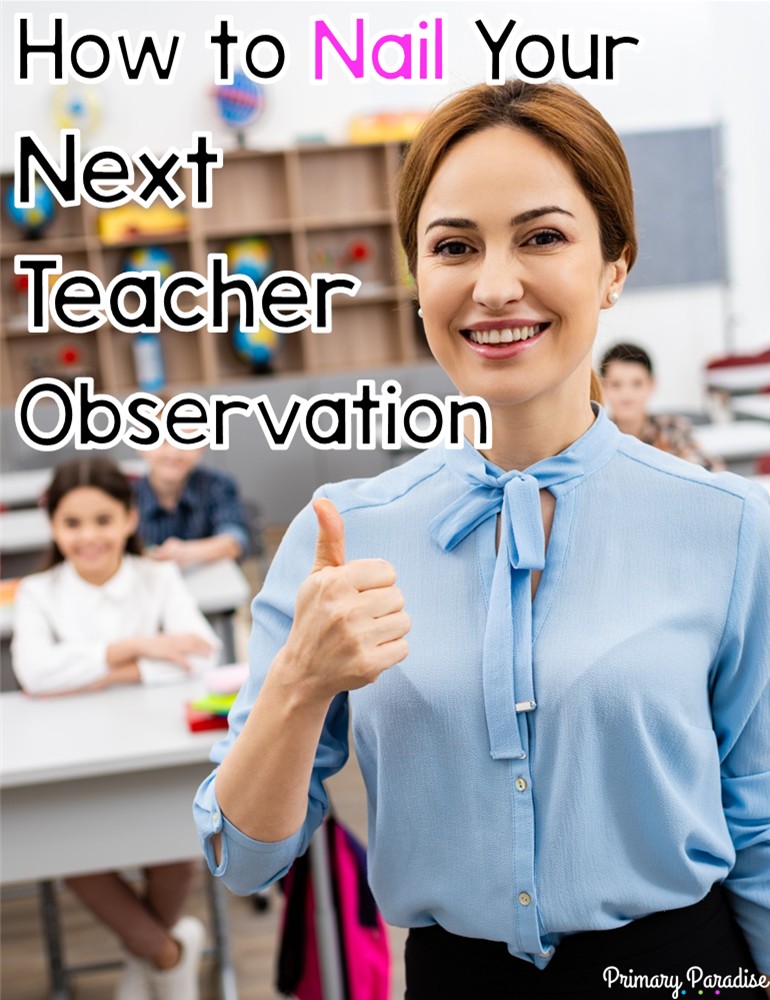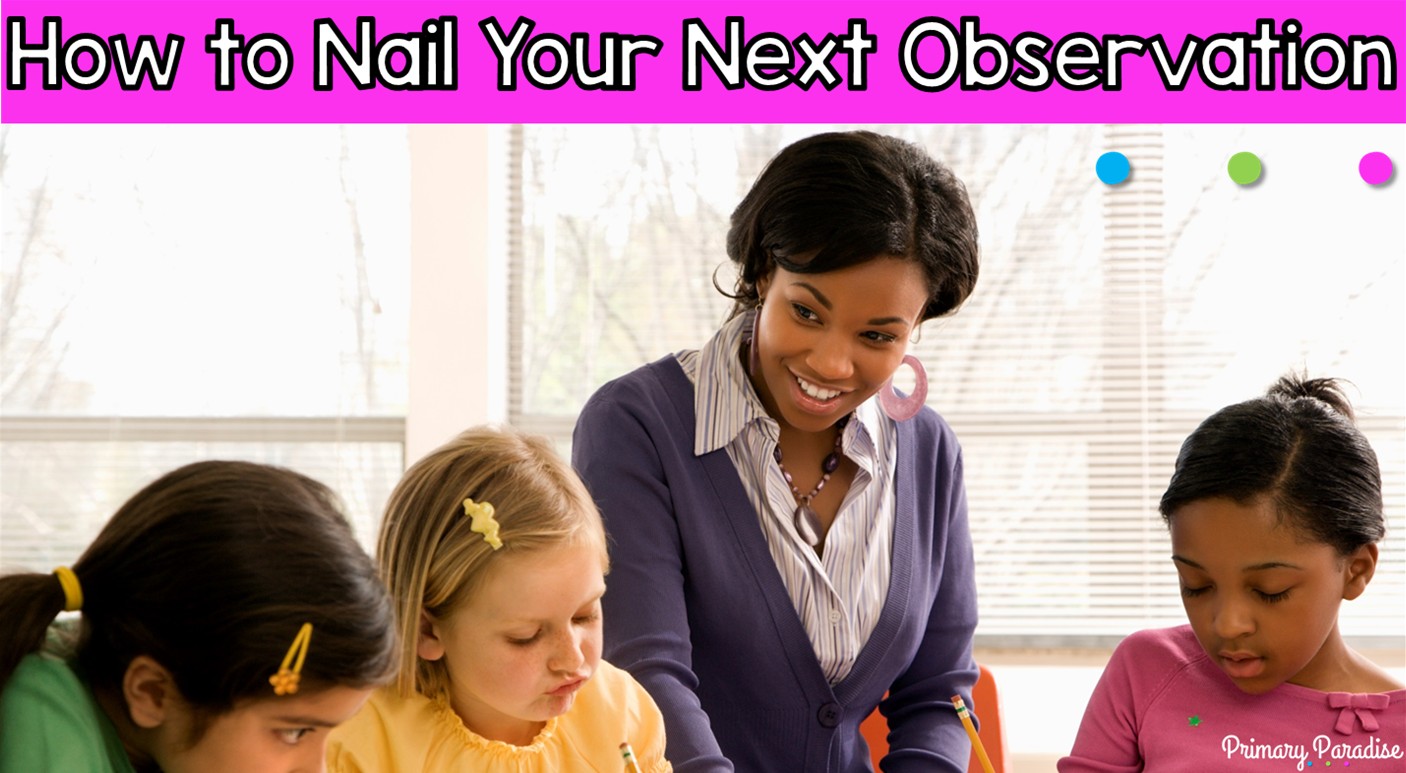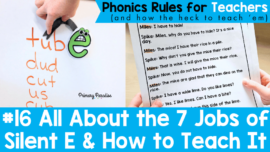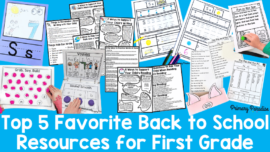Whether you’re a new teacher who just finished up student teaching, or a veteran teacher with many years under your belt, there’s one thing that likely sends you into a state of stress: teacher observations. Teaching is such a unique job. A million different things happen in your classroom each day, and it can be hard to show all of the hard work you and your students do in a 20-30 minute snapshot. However, there are some things you can do to help you stress less, nail your classroom observation, and impress your administrators.
You can’t control everything, but you can control your reaction.
Listen. Some days in the classroom are unicorn days where everything goes perfectly, and you walk out feeling an amazing sense of accomplishment. And some days are… not so magical. A student spills glue all over another classmate’s project. Someone pukes during story time. A couple students exchange punches. It happens, and unfortunately, it can happen during a classroom observation.
My first tip is, whatever happens during an observation, remain calm and handle it. If that means stopping mid lesson to switch gears and talk about how we treat others, do it. If that means coming to the aid of a sick student, by all means. Administrators know (hopefully) that students and teachers aren’t robots. If an issue arises, how you handle it says a whole lot more about you as a teacher than if you just try to push on with the lesson. So, if your lesson on multiplication is bombing because you realize students are still struggling with addition, take a breathe, switch gears, and focus on addition. Your administrator will be impressed with your quick thinking and flexibility, and you can justify your choice to switch gears in your post observation meeting.
Avoid the temptation to put on a dog and pony show.
My first year as a teacher, I thought that I had to REALLY do it up for an observation. And you know what? It was the worst thing I could do. My lessons went okay, and I got decent write ups, but I totally regret it. First, it was SO much extra work for one lesson. It wasn’t anymore impactful for my students, and quite honestly, I’m lucky my students didn’t call me out. Besides, I could have showcased how smoothly our typical activities and routines were instead of super stressing the whole time that I’d “mess up”.
So, as tempting as it is, my second tip is to do a normal lesson. Follow your normal routines, and don’t be tempted to do a crazy room transformation or get on a table and dance. Be yourself and it will:
- be more comfortable for you
- be more comfortable for your students
- be more authentic for your administrator
Of course, feel free to jazz things up a bit, and make it as engaging as possible. But, if you stick to a lesson that feels like you and your students, it’s bound to me more effective than trying to be something you’re not.
Back up your lessons with standards and goals.
Administrators love standards. They love goals. They love, love data. (I do too, so I can’t blame them.) Tip 3: when planning for an observation, be sure that you start with the standards and goal. If you’re going to be observed during a first grade math lesson on partitioning shapes, start with the standard. What do students need to be able to DO? Then, come up with a goal for that specific lesson- for example, students will be able to partition circles and rectangles into two and four even shares. Great! NOW, plan your lesson with that goal in mind.
Don’t start with a fun activity and then try to smoosh it and bend it to fit the standard. If you start with the standard, and then build your goal, you will be able to find an activity that meets both.
You might be thinking “but not all observations are announced”. This is true, but this is always how you should plan lessons. If you get into the habit of always starting with the standard -> fleshing out a goal -> and then developing a lesson, it will soon come very naturally.
Show your strengths during your teacher observation, but don’t stress about your weaknesses.
Sometimes you get to pick what an administrator observes. In those cases, pick something you feel confident teaching. This is especially good for the first observation of the year. If you really love teaching reading, and it is a strength, then pick your reading block for an observation. If you’re a rockstar social studies teacher, than pick social studies. If you engage your students will silly songs or centers or puppets or whatever, show it off! This is your time to shine.
But, we don’t always get to pick when our principal will pop in our room. If you feel like math is a weakness for you, and you’re going to be observed during math, try not to stress. Observations are supposed to be about growth. I realize that that’s not always the case, but there are some great administrators out there who are willing to give guidance and help. (See the following points for more tips about this.)
Ask for help.
So, if you are feeling less than confident about your observation skill/subject/topic, what can you do? You can ask for help, and you should! Tip four: reach out to veteran teachers and ask them to help you plan your lesson. If time permits, ask to use your free period to observe them in action. If you have a teacher coach at your school, ask them for help as well. Ask in teacher Facebook groups and forums. The best teachers know their strengths, but also are willing to ask for help with their weaknesses.
Take advantage of your pre observation meeting.
If your teacher observation is planned, you most likely will have a meeting with your principal before they come to observe you. This meeting allows them to see what you’re planning on doing. Be sure to come prepared with your lesson plan/outline. This meeting can also be a fantastic opportunity to ask questions. You can ask them what, specifically, they’d like to see. Share your lesson plan, and ask for feedback. If they have ideas, consider making changes. Again, administrators will appreciate your willingness to be flexible and learn. It also lets you know what to focus on and what to let go.
Prep your class… or not.
There are two camps when it comes to teacher observations: tell your class ahead of time, or don’t. It’s really a matter of preference, BUT I will tell you which camp I recommend steering clear from. Please, please don’t tell your students that the principal is coming in to check on them and to watch them and to make sure they’re “being good”. First, this can and will backfire because chances are the administrator will talk with your students. Kids are very honest, and will flat out tell them what you said. In my opinion, that doesn’t look great. Second, that’s just not true. So, if you decide to tell them ahead of time, tell them the true. Just let your class know that the principal is coming in to see what happens in your classroom. They want to see how you’re teaching and how students are learning. Simple and effective. And, if your administrator asks student’s questions, it won’t be awkward.
Or, you can say nothing. If administrators are frequently in your room, which is sometimes the case in certain schools, they won’t think anything of it. In my last school, my principal made a habit to pop into classrooms daily, so my students didn’t think it was a big deal at all.
Be open to feedback.
It’s very hard to listen to criticism. Even if it’s coming from the best place, and especially if it’s not, it’s hard to hear what we need to work on. It’s easy to get stuck in the mindset that “they didn’t see xyz because they weren’t there long enough”. Or to brush feedback off because “normally that lesson goes differently”. If we want to grow as teachers, we need to be willing to listen to the things we need to improve. No one is the perfect teacher, and things often look and feel differently from the outside. Objective feedback can be extremely helpful.
In a perfect world, all administrators would share things you did well as well as offer constructive feedback. However, that’s not always the case, which can put you in a defensive posture right away. But, before you brush aside any criticisms or suggestions, try to look objectively at your lesson and really think about the suggestions given. It never hurts to try something new. It might work, and you might grow as a teacher. Or, it won’t work. And that’s okay too. Being willing to listen and implement suggestions doesn’t highlight your weaknesses. It shows you’re still willing to learn as an educator.
Breathe and be a duck.
Sometimes you’ll nail your teacher observation, and well, sometimes you won’t. That’s okay. We all have bad lessons and bad days. One 20 minute observation does not define you as a teacher. One person’s opinion doesn’t negate the hard work you’ve put into your students. If you receive a less than stellar observation, take the time to think about the feedback given, as stated above. But continue to move forward.
There are, unfortunately, some administrators who will always only look for the negative, or refuse to give high scores. If that’s the case, then just let it roll off of your back like a duck in the water and continue to teach your students.
What would you tell your students?
Lastly, whatever the outcome of your observation, remember it’s one small snapshot of what you do. Would you let your student give up after one poor test score? And, if a student gets a 100% on an assessment, are they forever done learning? Of course not.
Ultimately, a classroom observation is just one measurement tool to help you assess yourself as a teacher. It doesn’t define you. Whether you score poorly or very high, our growth and learning as teachers never stops. It’s just one sign post along the road to let us know if we’re headed in the right direction. The best part is, we can always stop, ask for directions, and find a new path to travel down. Just like we would ask our students to keep learning, we must continue to grow and learn as well.
You can join my FREE Facebook Club for k-2 teachers here!
Find me on Instagram, Facebook, Twitter, and Pinterest!




